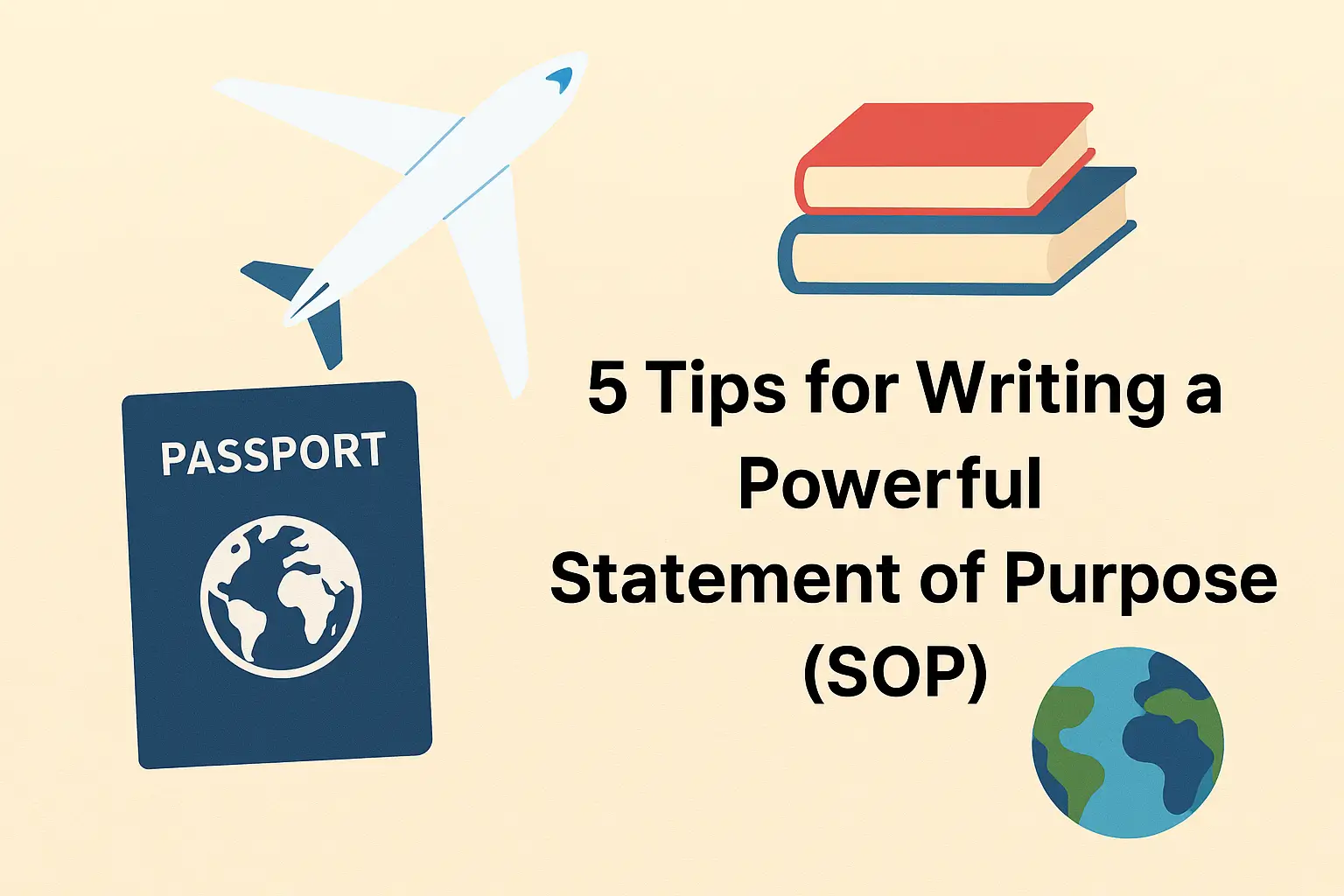Blog
5 Tips for Writing a Powerful Statement of Purpose

The Statement of Purpose is probably one of the most misunderstood aspects of graduate applications. Most students pass it off like it is just another essay about themselves, and naturally, write monotonous stuff that doesn’t stand out. That is why the university admissions committee puts a hefty weight on statements of purpose and their structure. They want to see whether you take an interest in letting them know how much you want to study at their university.
Whether you’re applying for a student visa, graduate program, or scholarship, a strong SOP can make all the difference.
Now, almost 99% of the statements are structured similarly, and oftentimes, students copy-paste and edit statements of purpose from their seniors or friends, making it sound even more generic or irrelevant to their applications. If you want to stand out from the crowd, if you want the admissions committee to remember your essay at the end of the day, even after going through hundreds of applications, if you want to gain that extra advantage by being somewhat special and unique, you will have to draft a great statement of purpose.
With countless students applying every year, knowing key deadlines for programs in the US, UK, Canada and Australia is just as important as crafting the perfect SOP (for example, see our summary of admission deadlines at the article. A strong and timely Statement of Purpose can make all the difference.
Best Strategies to Write a Powerful Statement of Purpose (SOP) for University Admission 2025
It is important that you follow a specific strategy when it comes to drafting your statement of purpose. Though most students write whatever comes to their mind, or whatever they see on the internet, you are not most people.
Storytelling: The Secret to a Winning SOP

While a newspaper gives you mere news and some eye-catching headlines, a novel tells you a story, a beautifully written piece of literature that you will be emotionally connected to. It brings those human feelings out of you and involves you in its storyline. You imagine yourself in the place of the narrator/character and understand why he/she has done that or taken such decisions. We remember stories much easier than statements.

Quantify Achievements in Your SOP
Even though we asked you to write a story, you will have to remember that your story should not read like a thesis. It should rather serve as the best source of information about you. And when it comes to information, numbers play a key role. Your story should be not only qualitative, but also quantitative. And that means, your story must contain measurable quantities instead of just stories, so the reader can understand the depth of it.
Add Clarity to Your SOP
You have to make sure that whatever you say in your statement of purpose, you are very specific with it. Don’t just say something because you think it will impress the admissions committee. Whatever you say, you have to really dig into the details. Be introspective. Don’t just say “I chose this degree because I love this field.” Explain clearly why you love this field, what made you decide that you want to work in this field for the rest of your life, what skills you are trying to amass, why it completes you as a person, etc.

Personalize Your SOP
One of the biggest mistakes students make is to prepare a basic template for their statement of purpose, and if they are applying to more than one university, they simply change the relevant names and details. But the rest of the statement is an exact copy. This is never a good idea, because though they might seem quite similar to each other, every university is vastly different from the others. Each of them has a diverse set of characteristics that define them, and their cultures, methodologies, visions, values, mottos, strengths, weaknesses, etc., vary greatly. These things are much more important than the departments, or university rankings, or number of Ph.D.D.s or other materialistic qualities. So, if you are applying to multiple universities, you need to factor in all these qualities of every university and customize your statement accordingly.
Use a Formal Yet Friendly Tone in Your SOP
Nearly all statements or essays come under two categories: The super formal and the super friendly. The first category is when you write a statement of purpose that is so formal, it looks like you are writing to your lieutenant in the military. The second one, of course, looks like a casual email to a friend. Now, when asked which one seems like a better choice, most students say the formal way is the way to go, and super friendliness is a big no. And still, a minor set of applicants think they can outsmart the admissions committee by sounding friendly, welcoming, and funny.
Always personalize your SOP according to each university’s values and goals to make it stand out from generic essays.
Conclusion
Writing an impressive Statement of Purpose (SOP) requires reflection, clarity, and authenticity. It’s your opportunity to speak directly to the university’s selection committee, so make every word count.
Focus on your goals, motivation, and uniqueness, and you’ll craft an SOP that not only impresses but also inspires.
